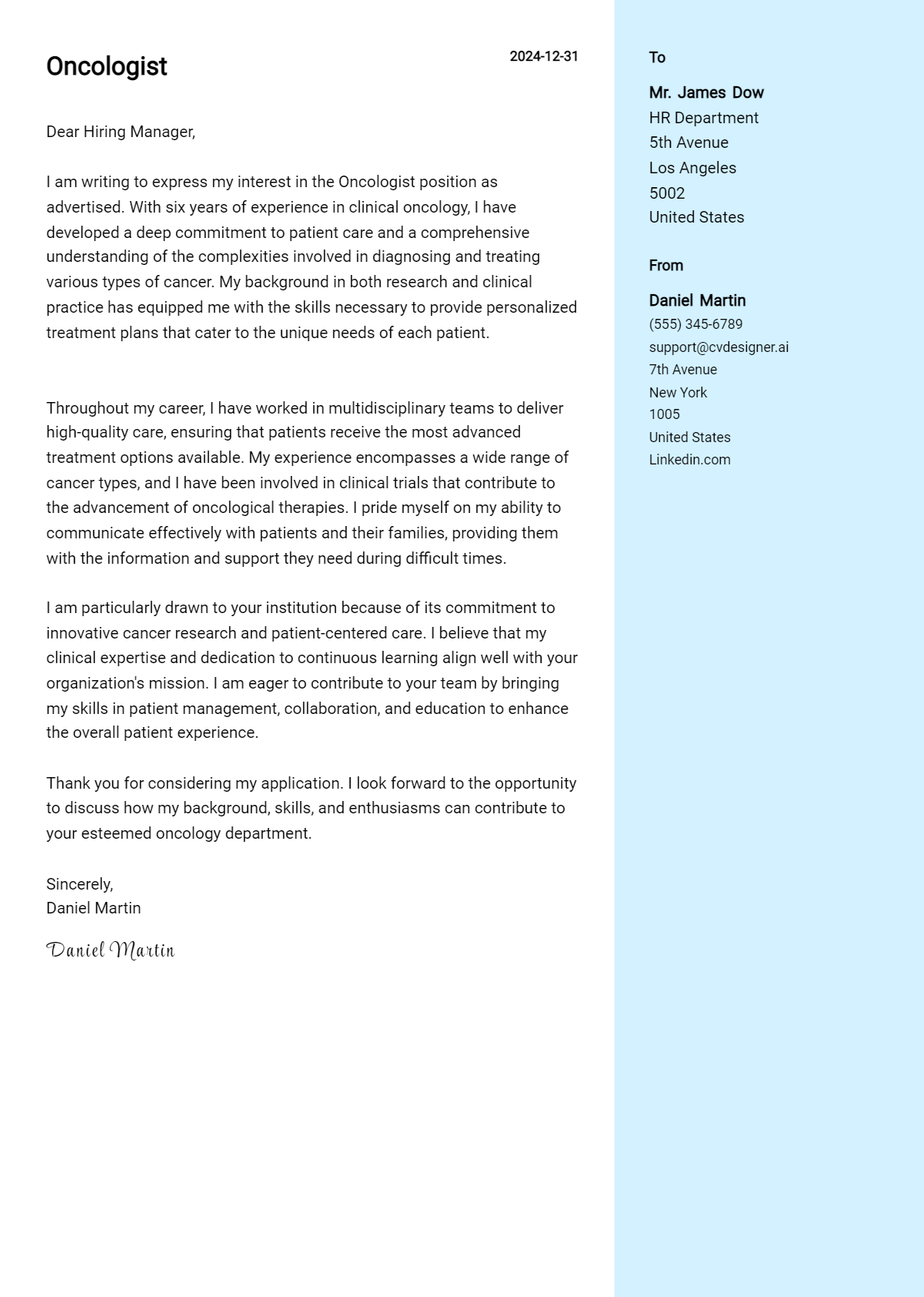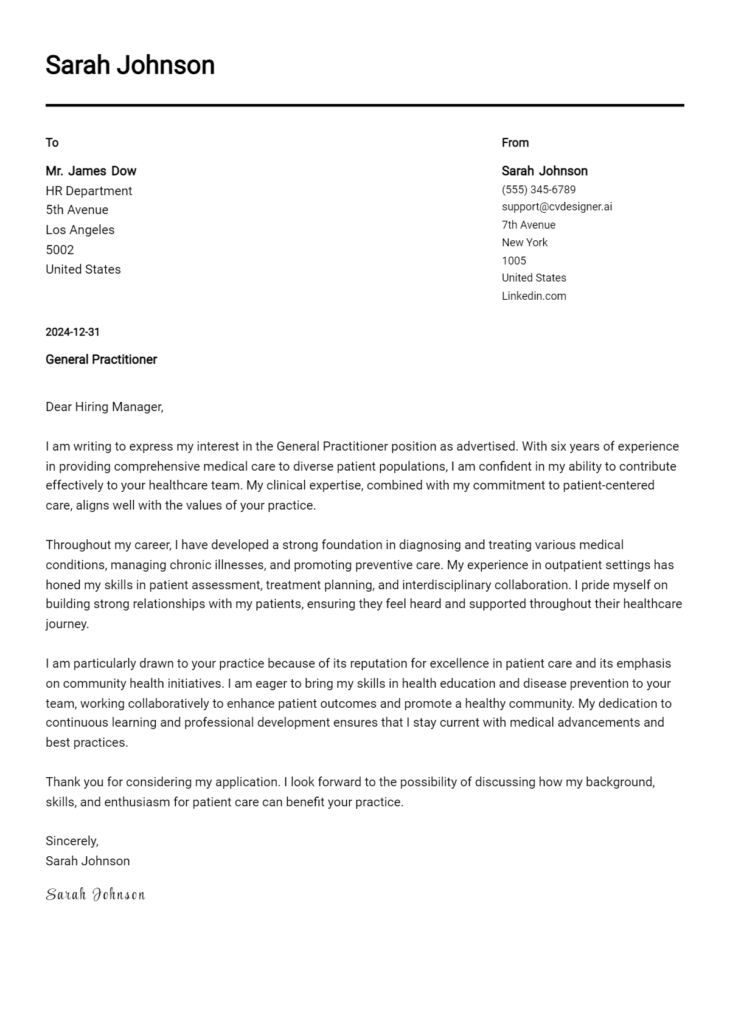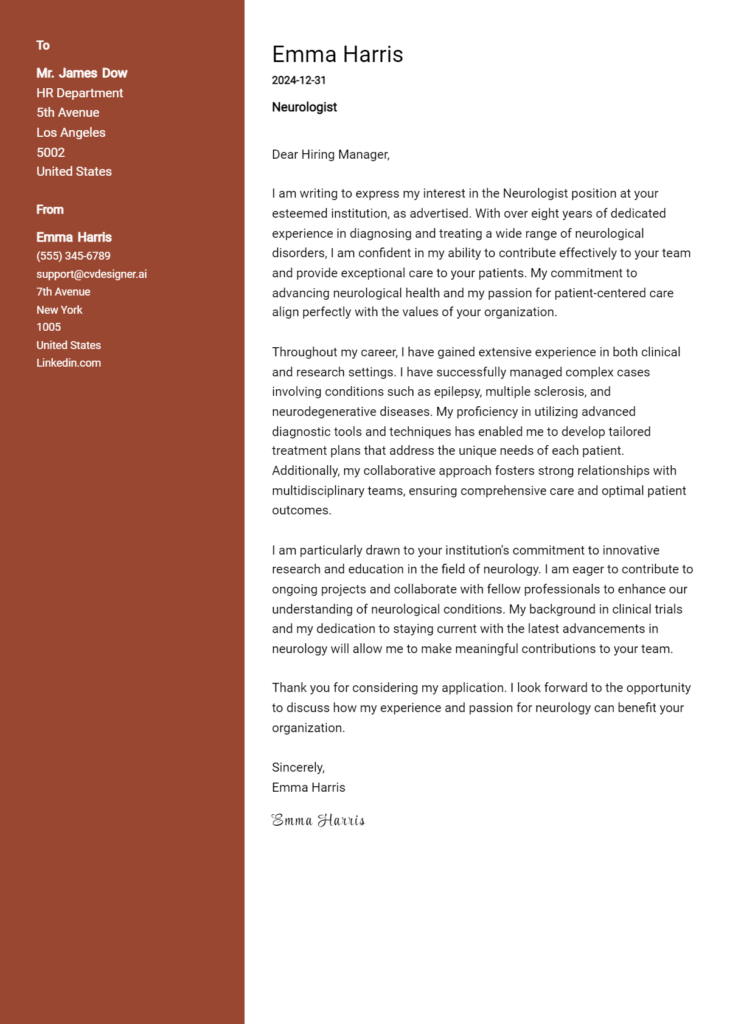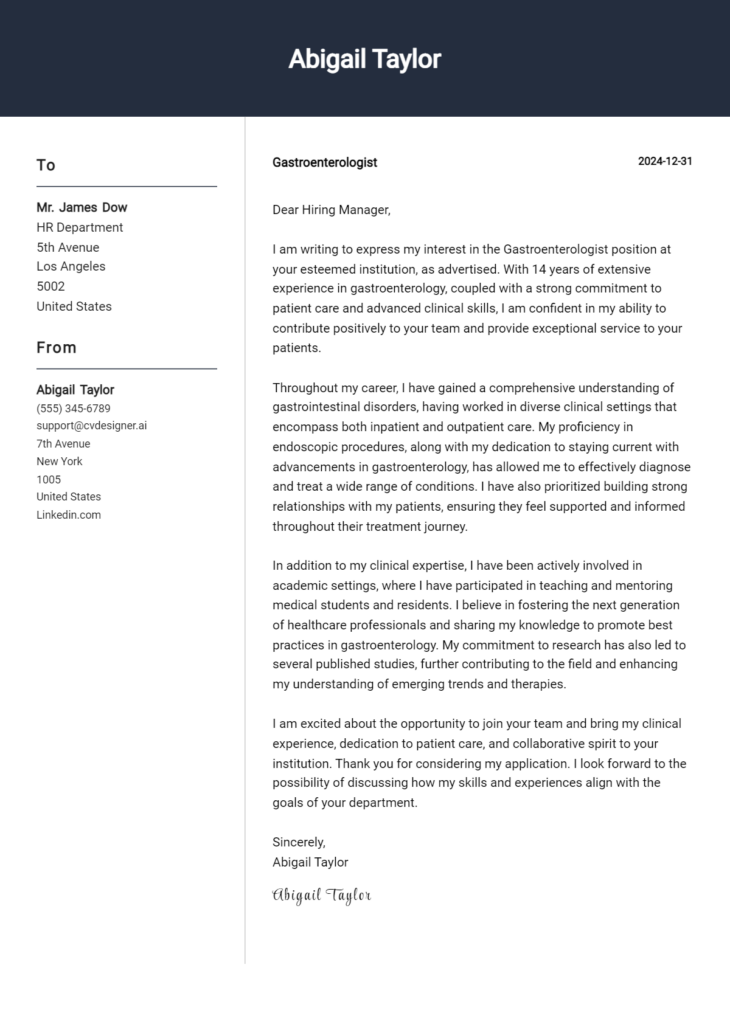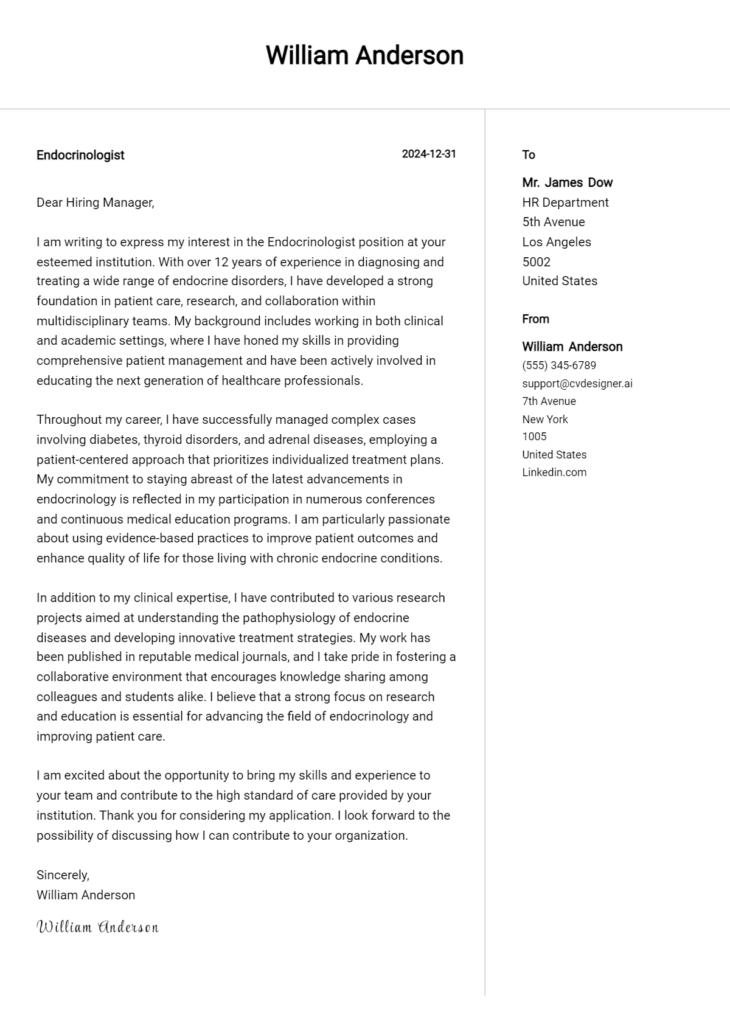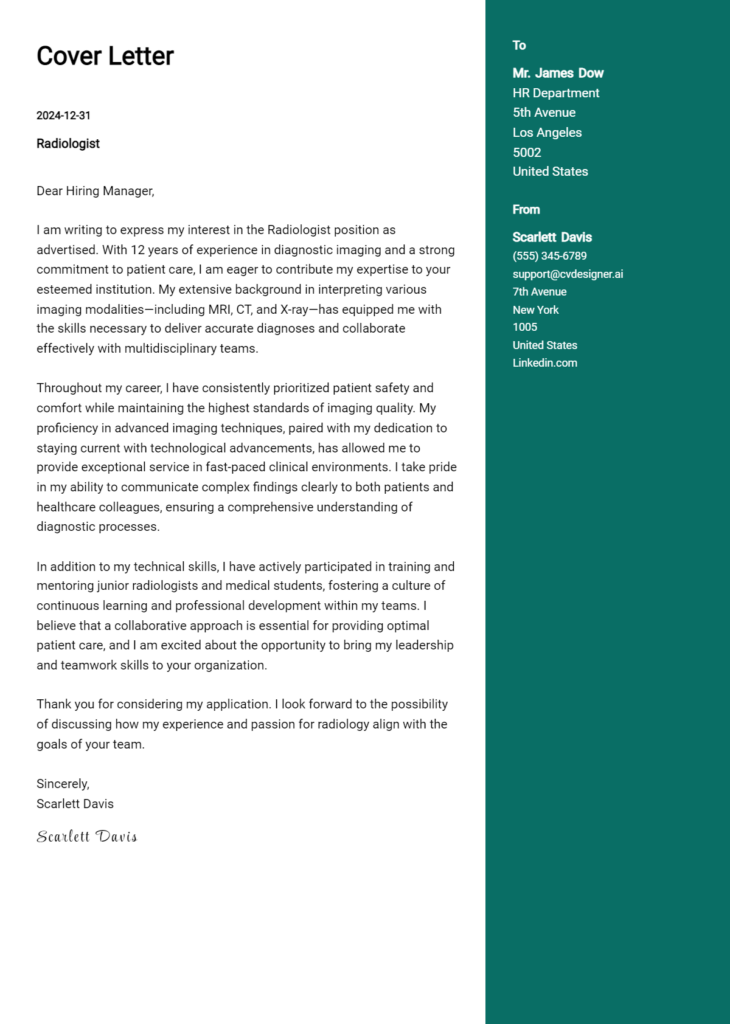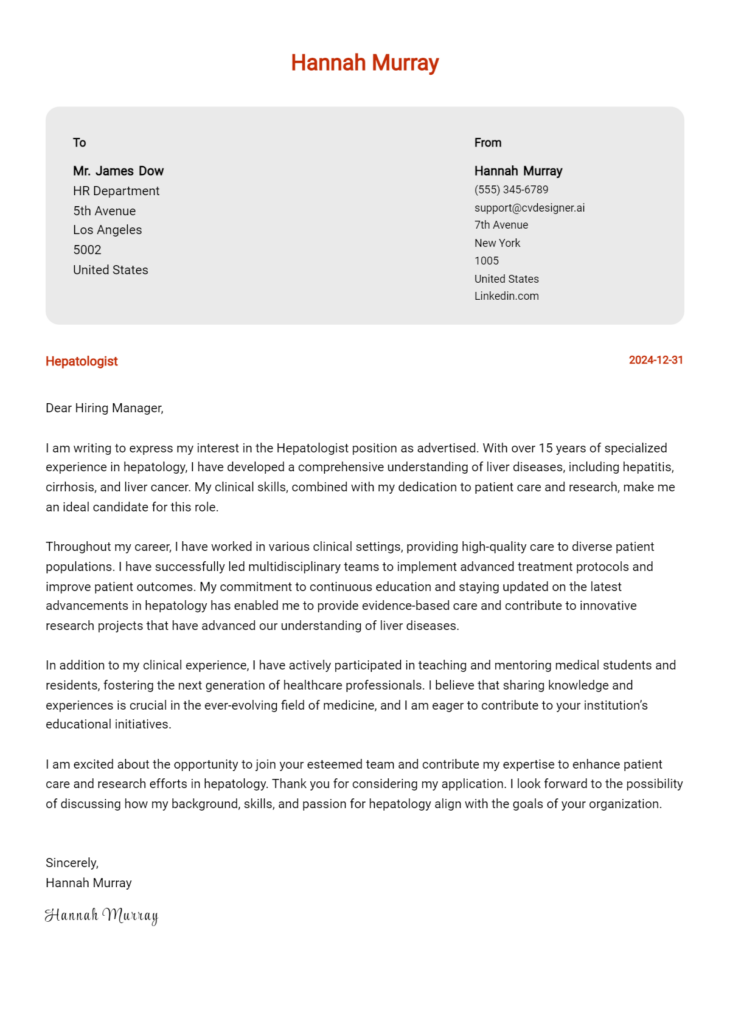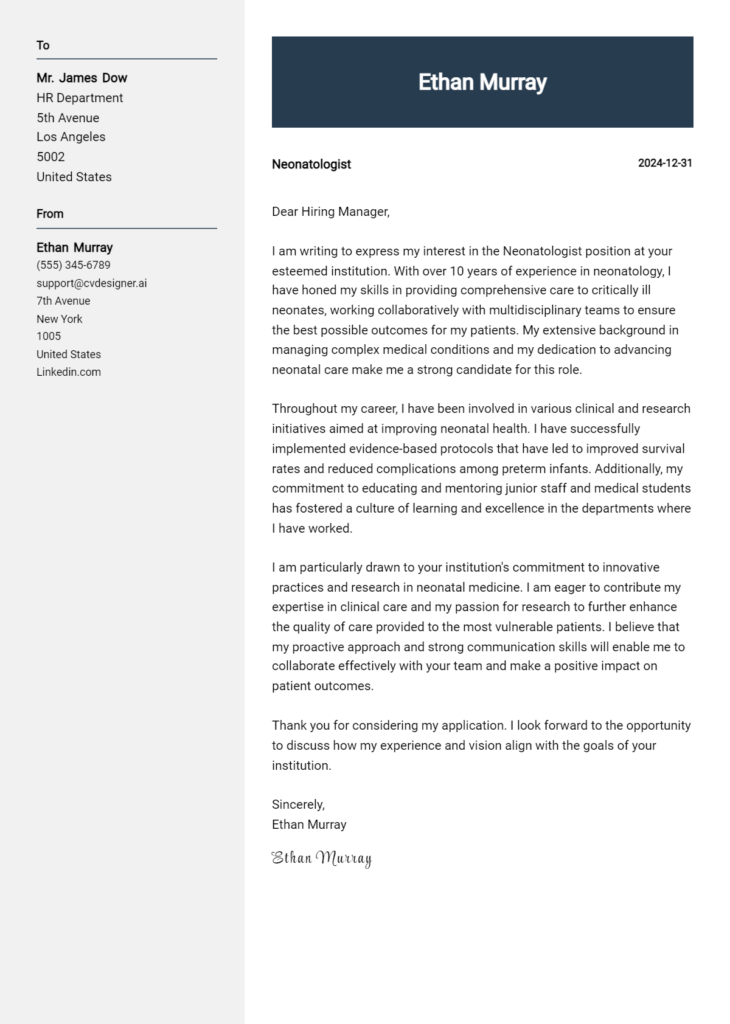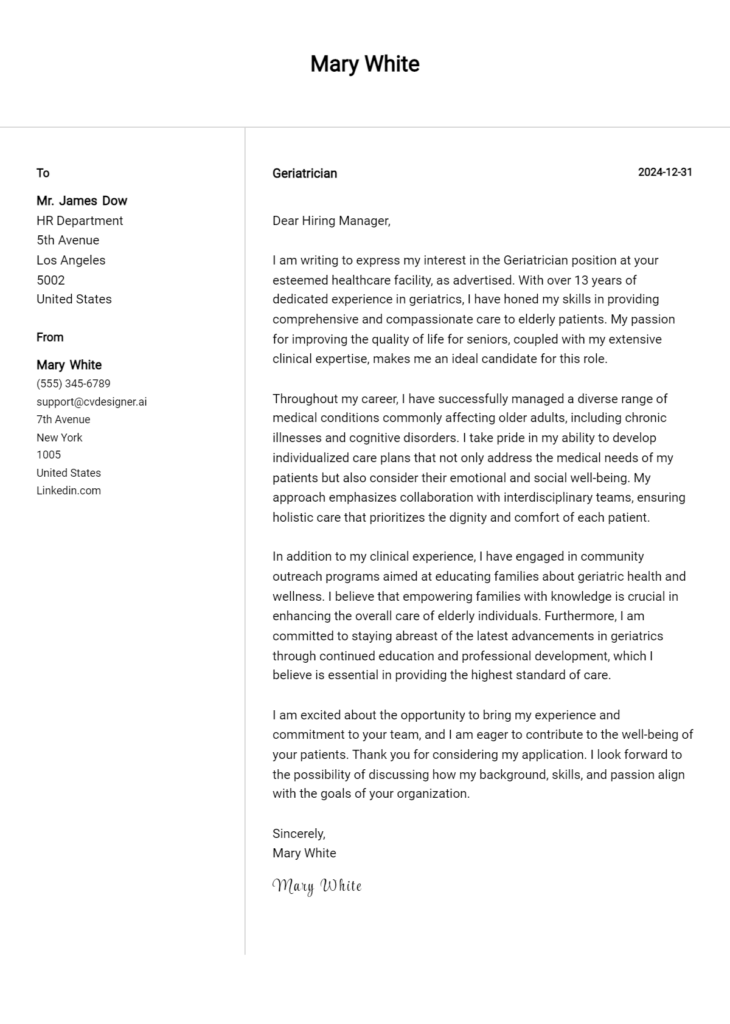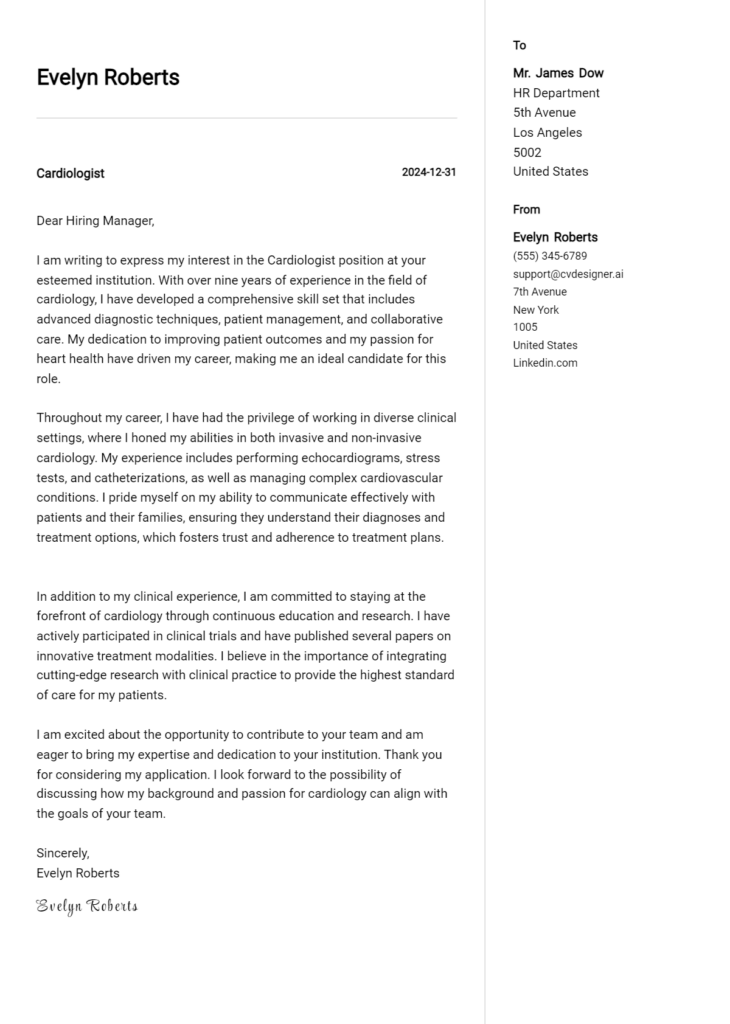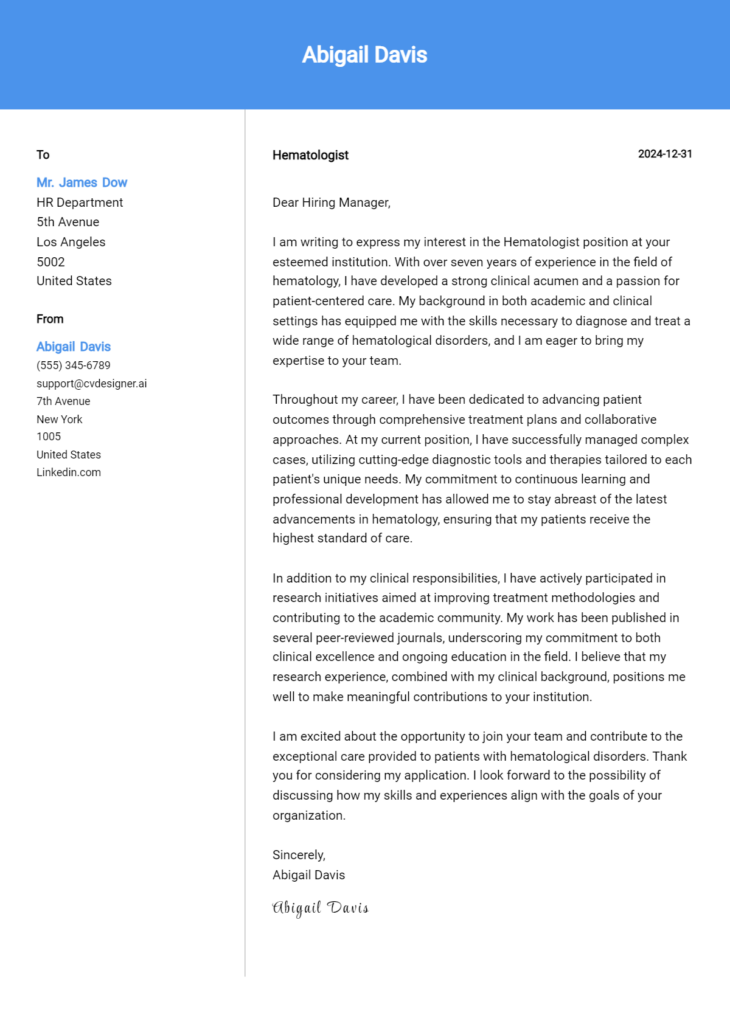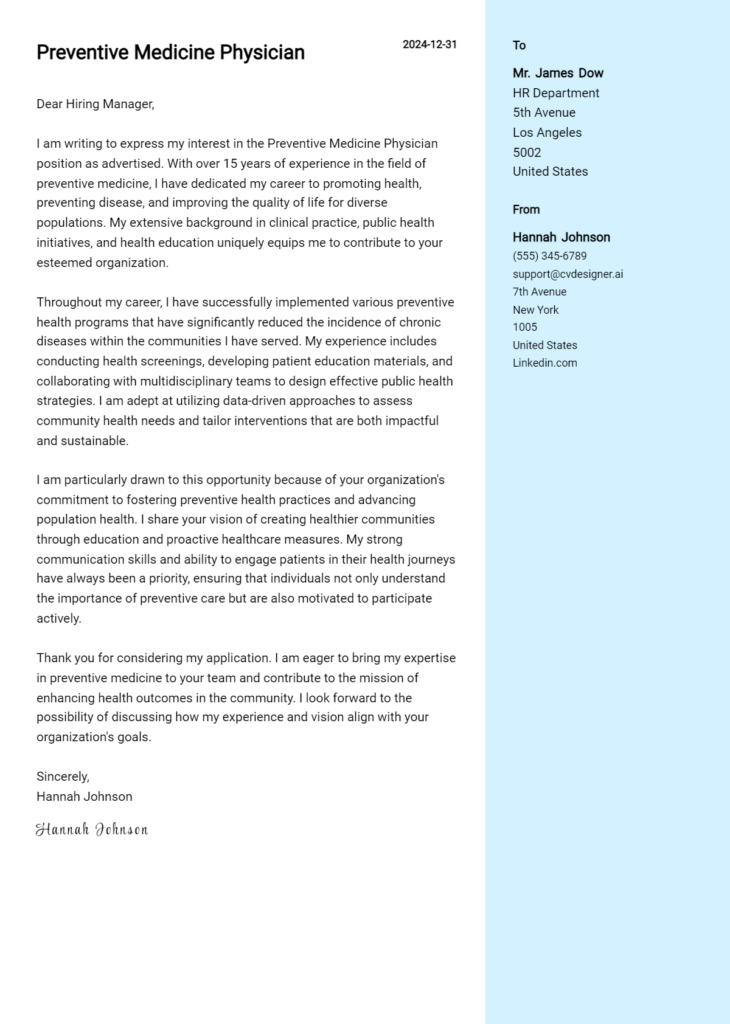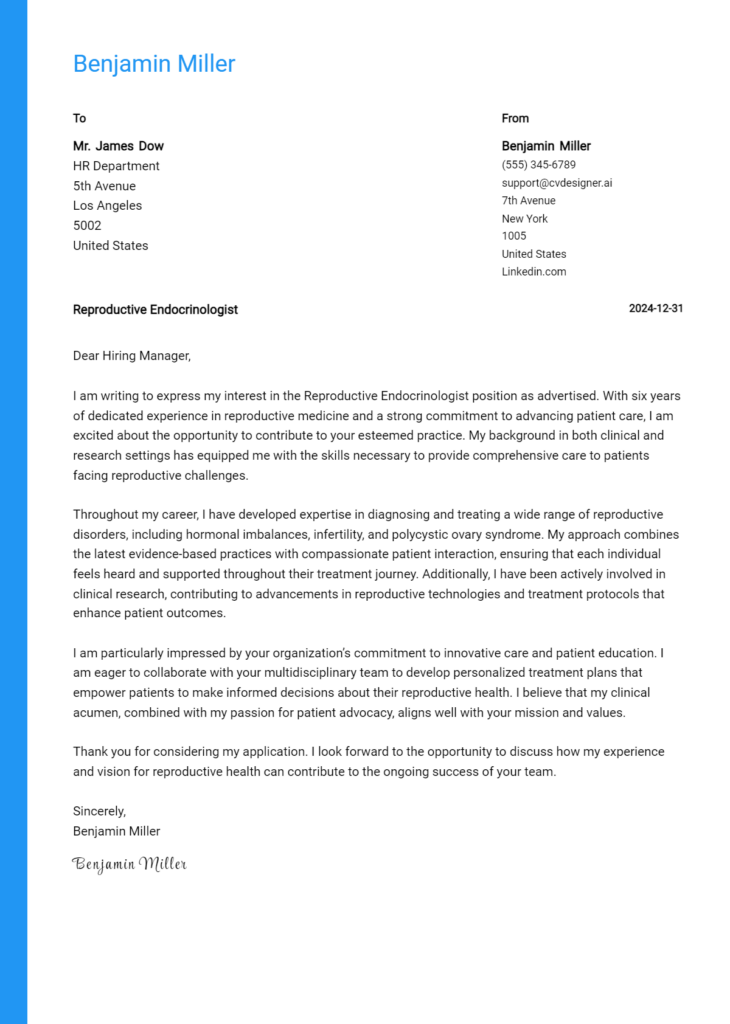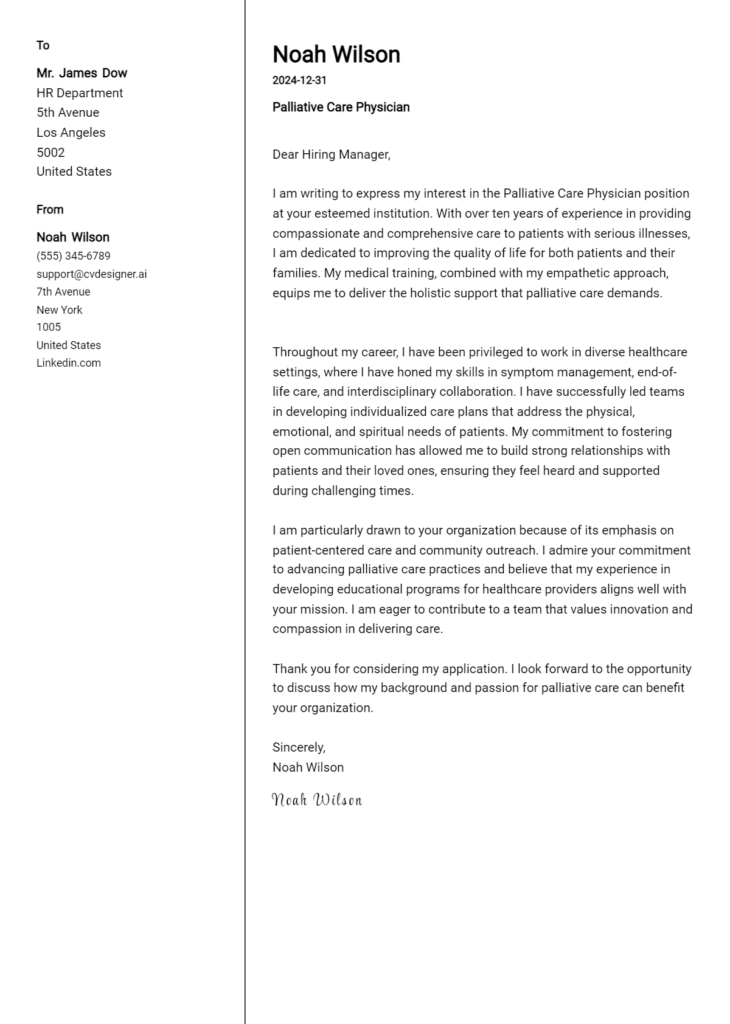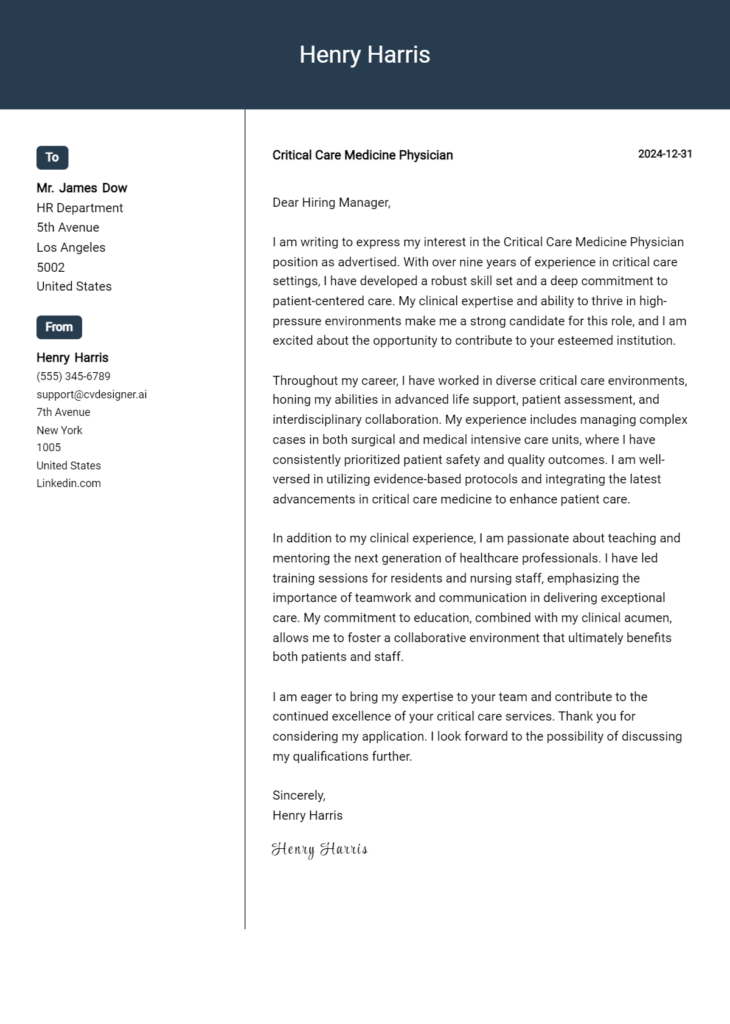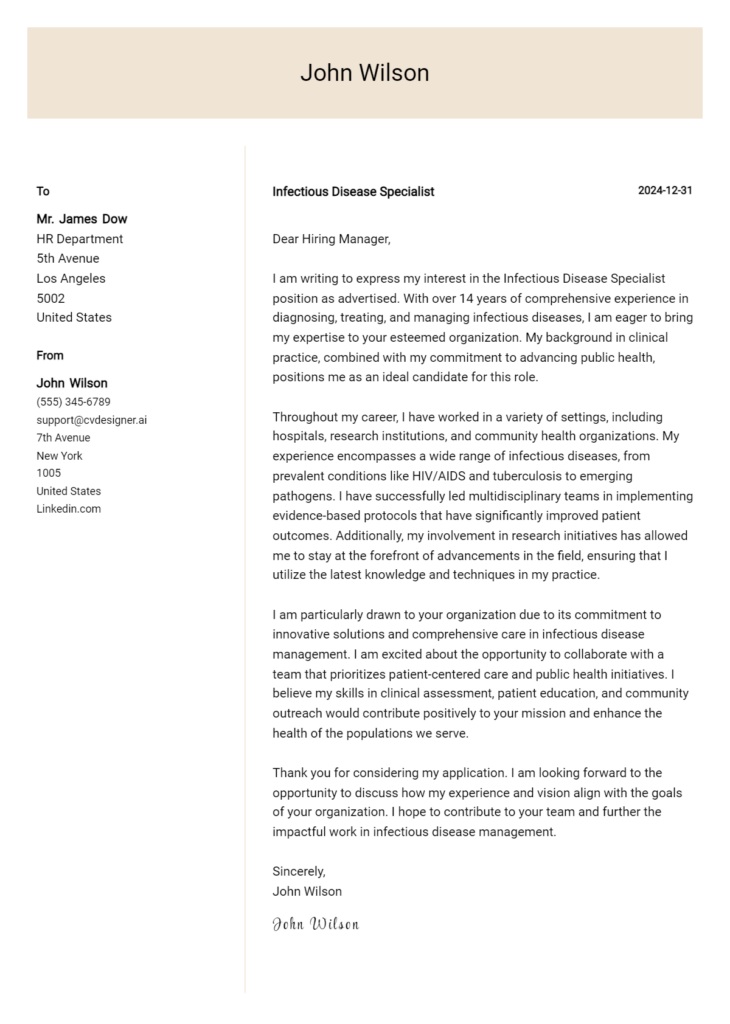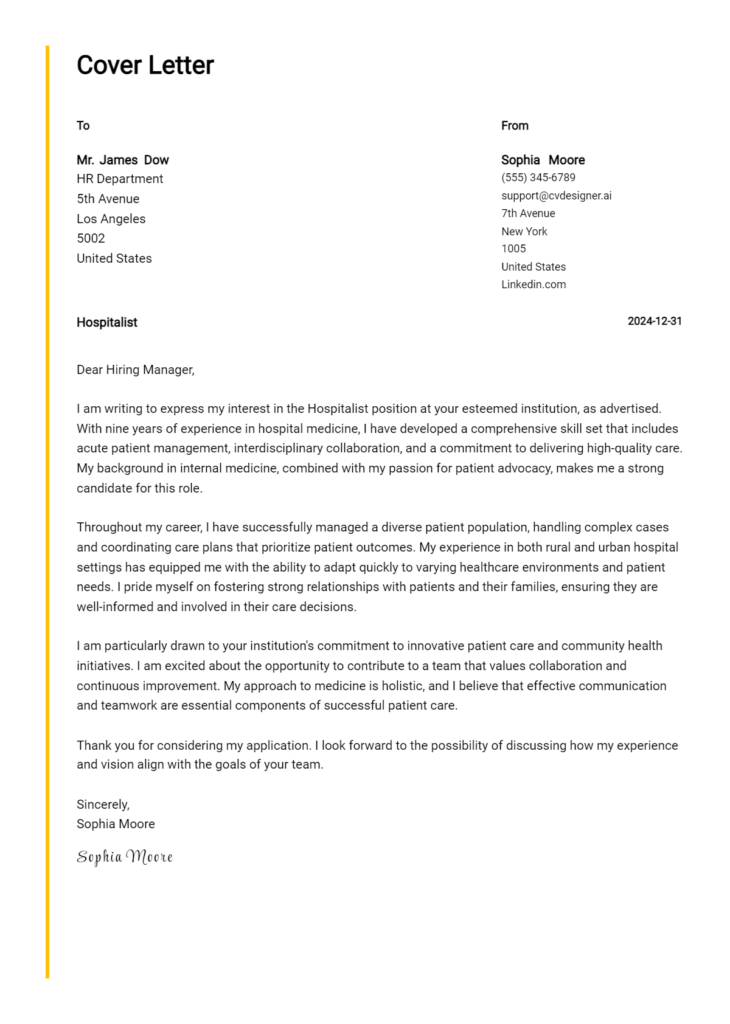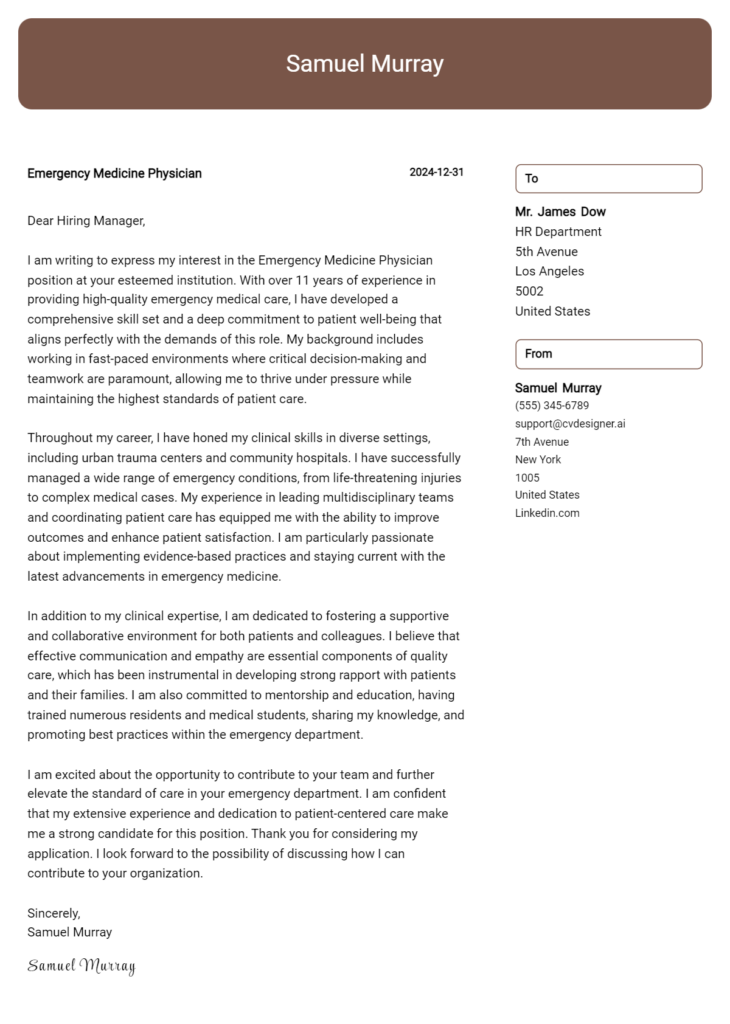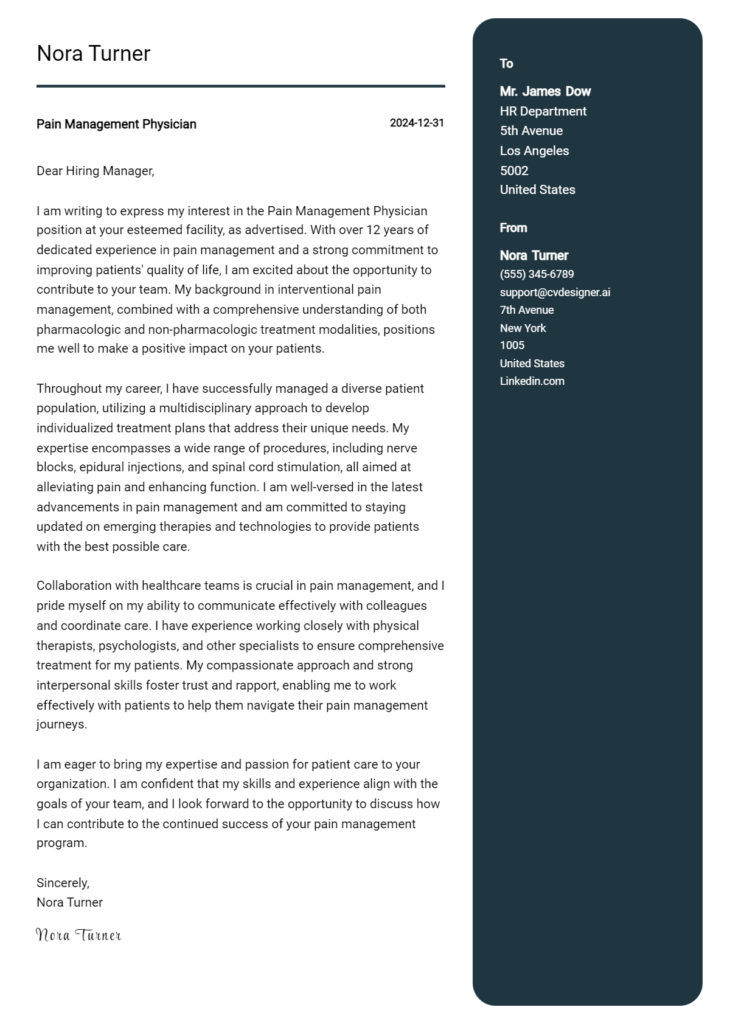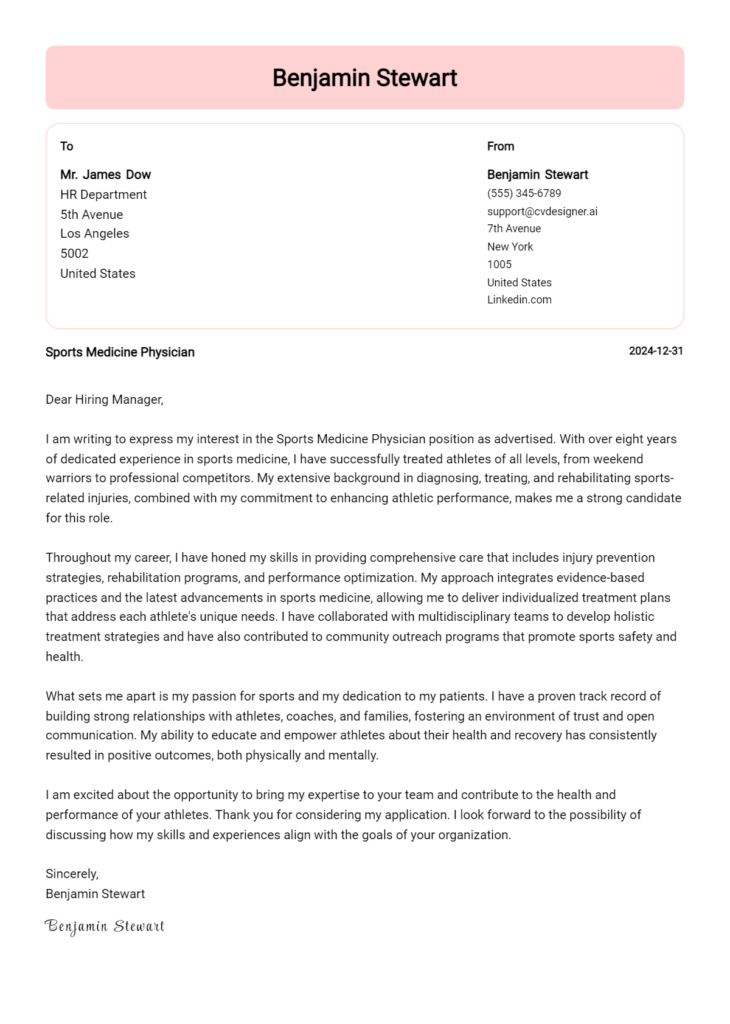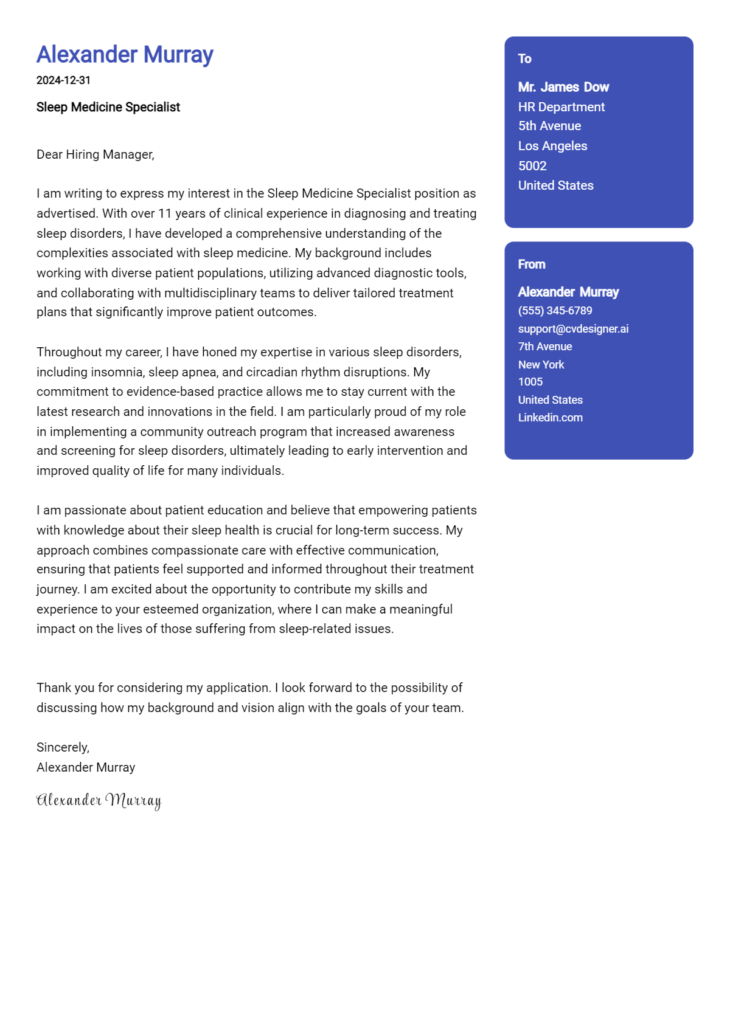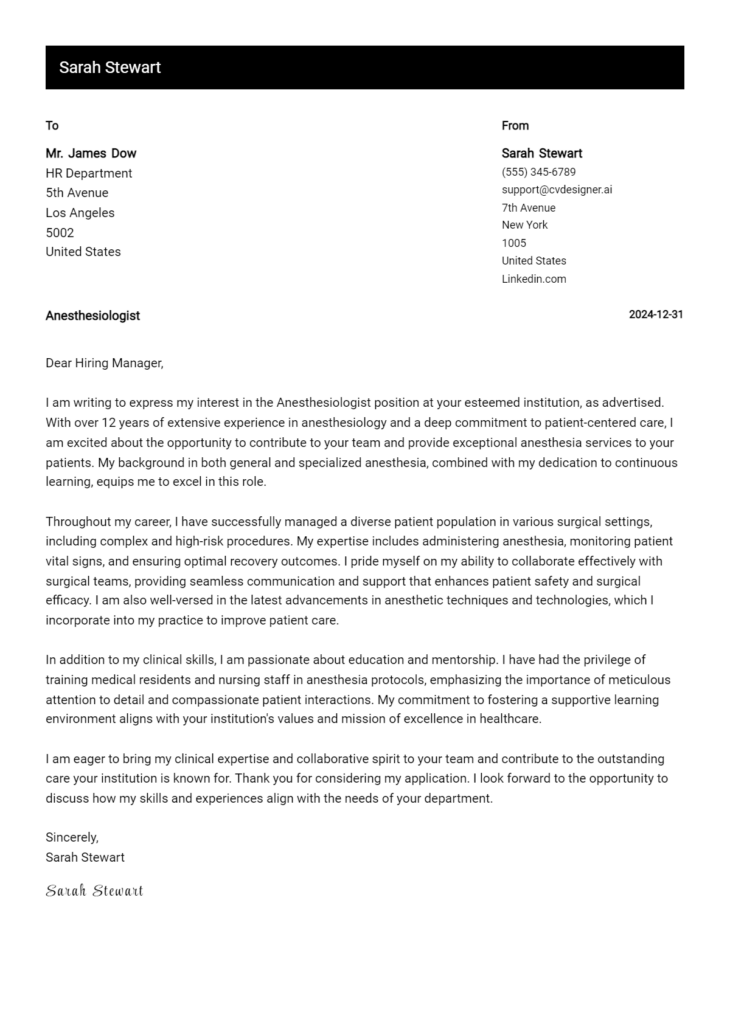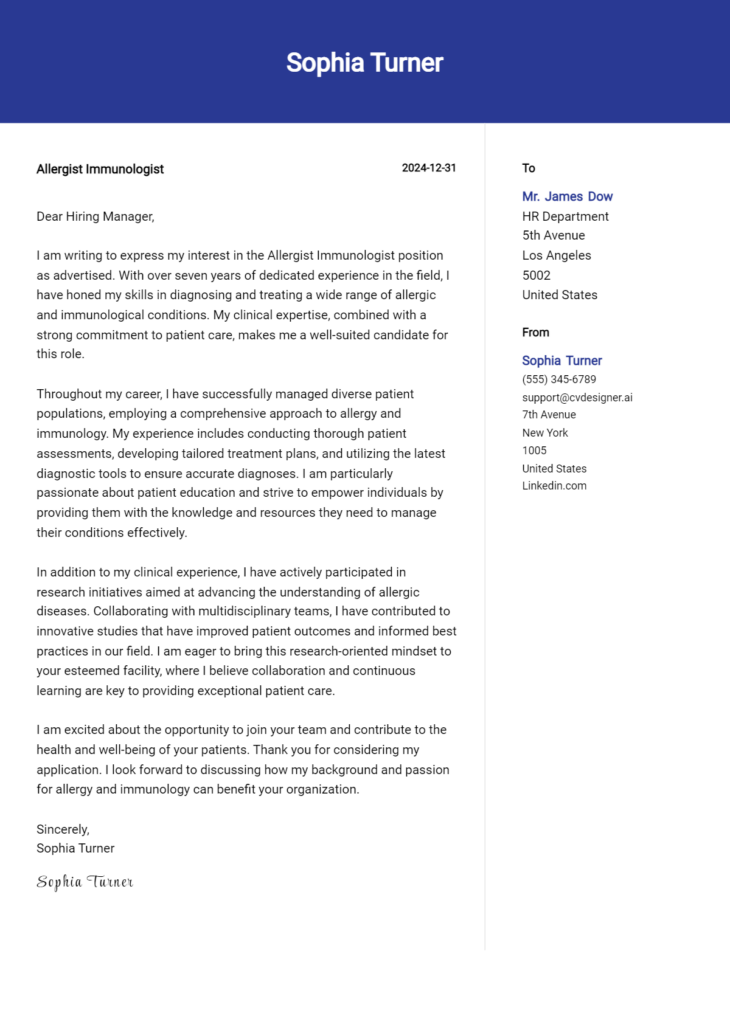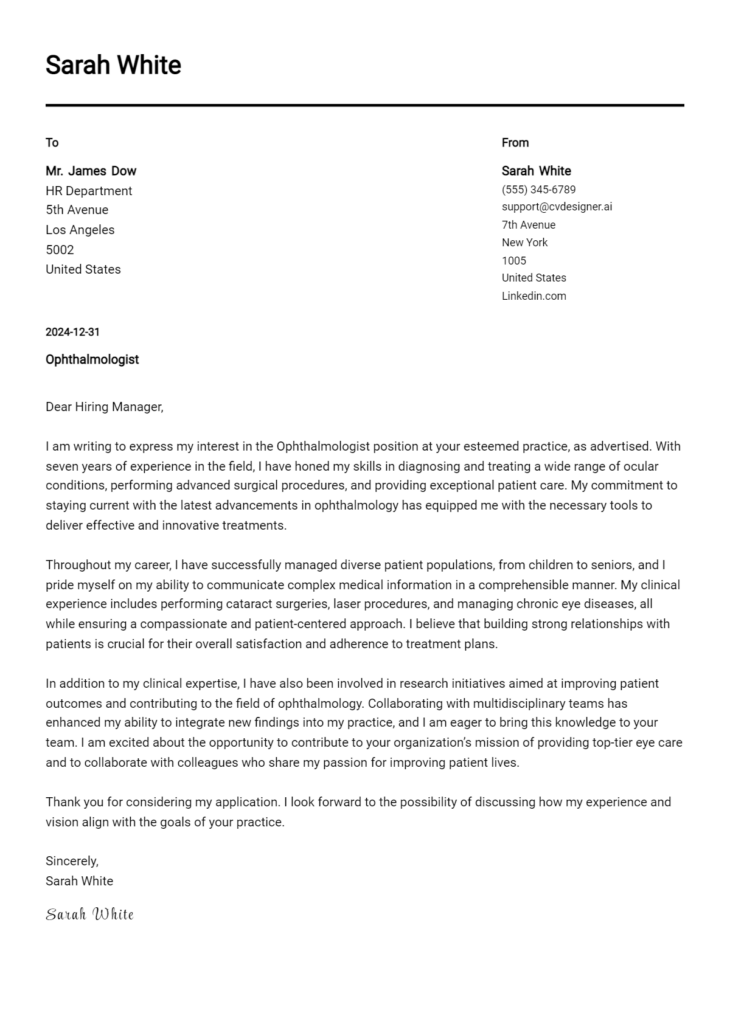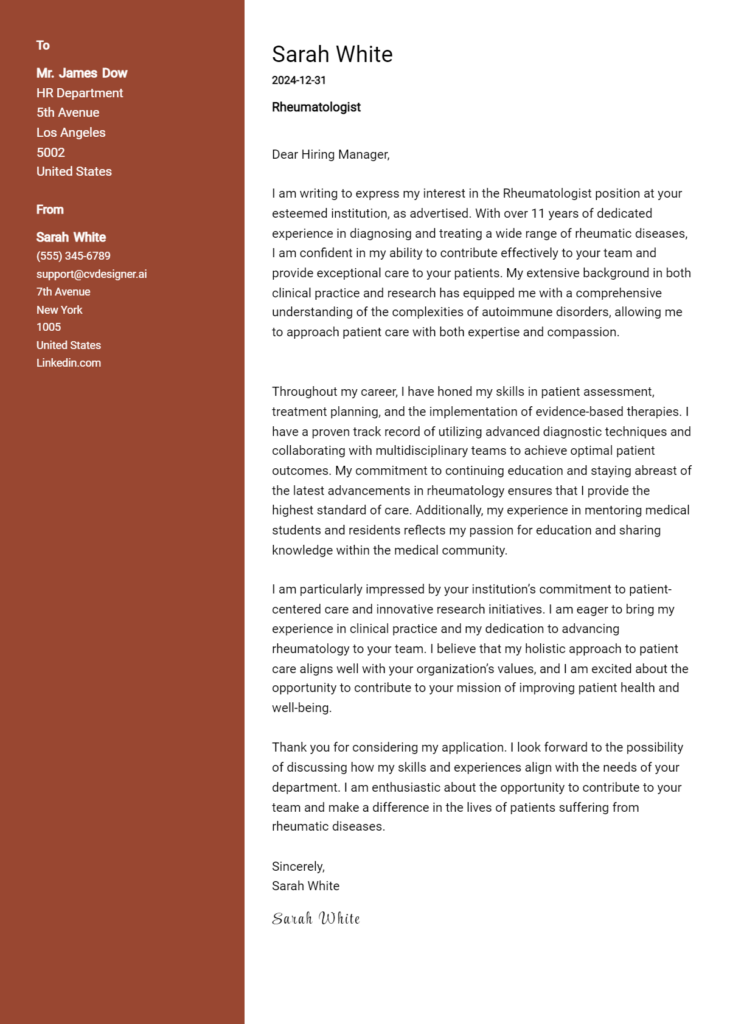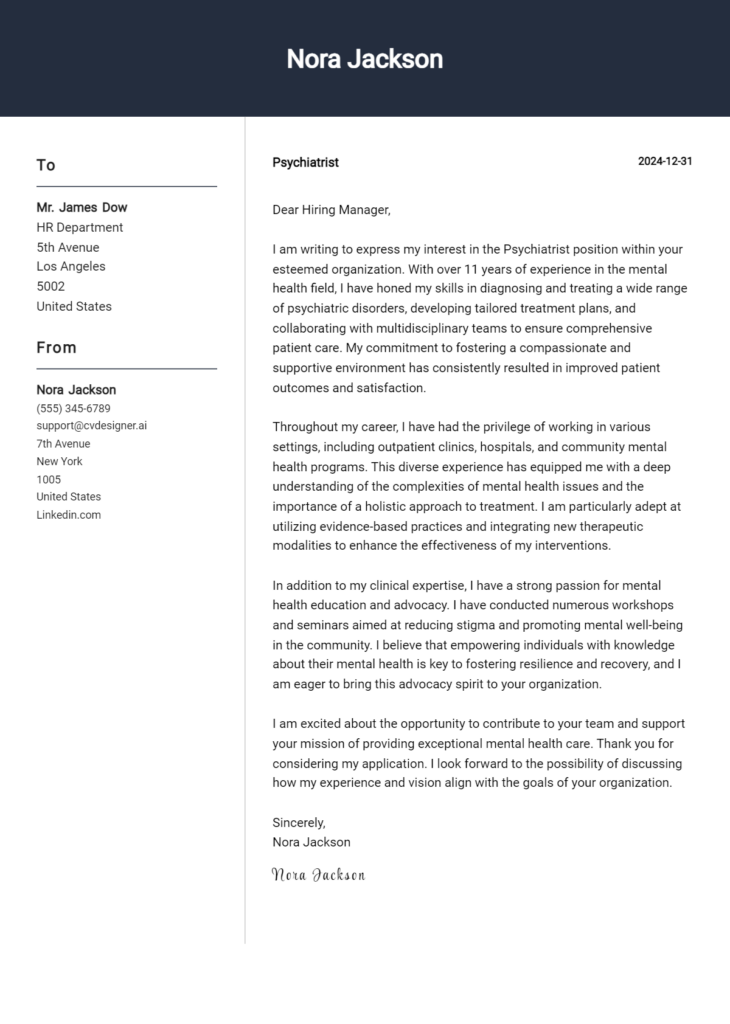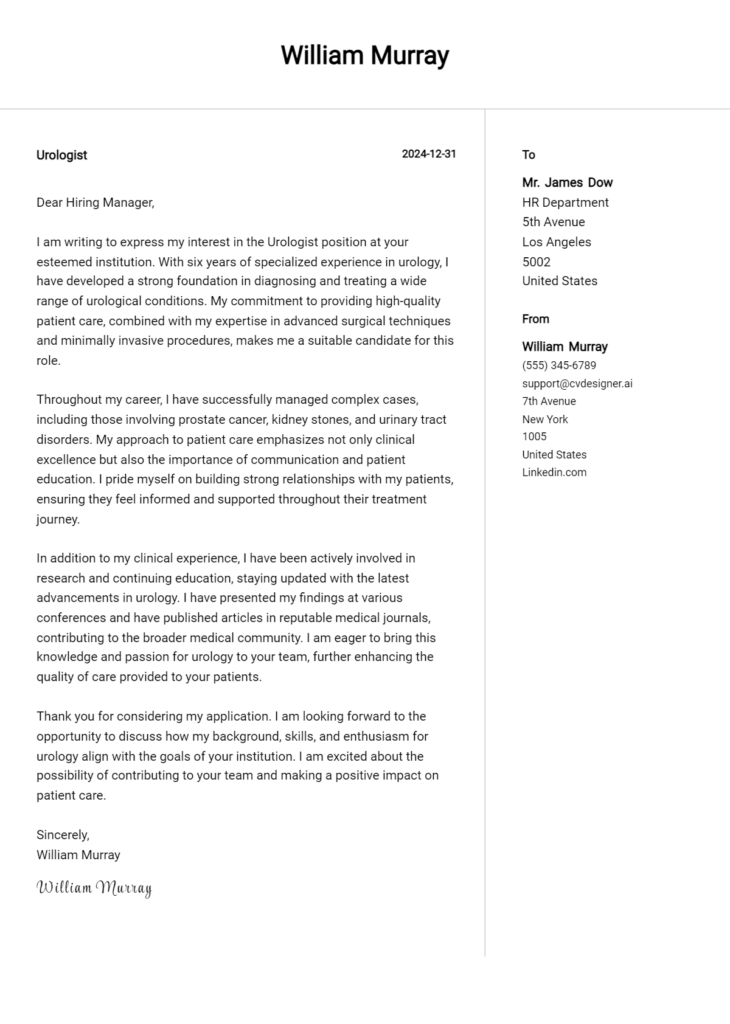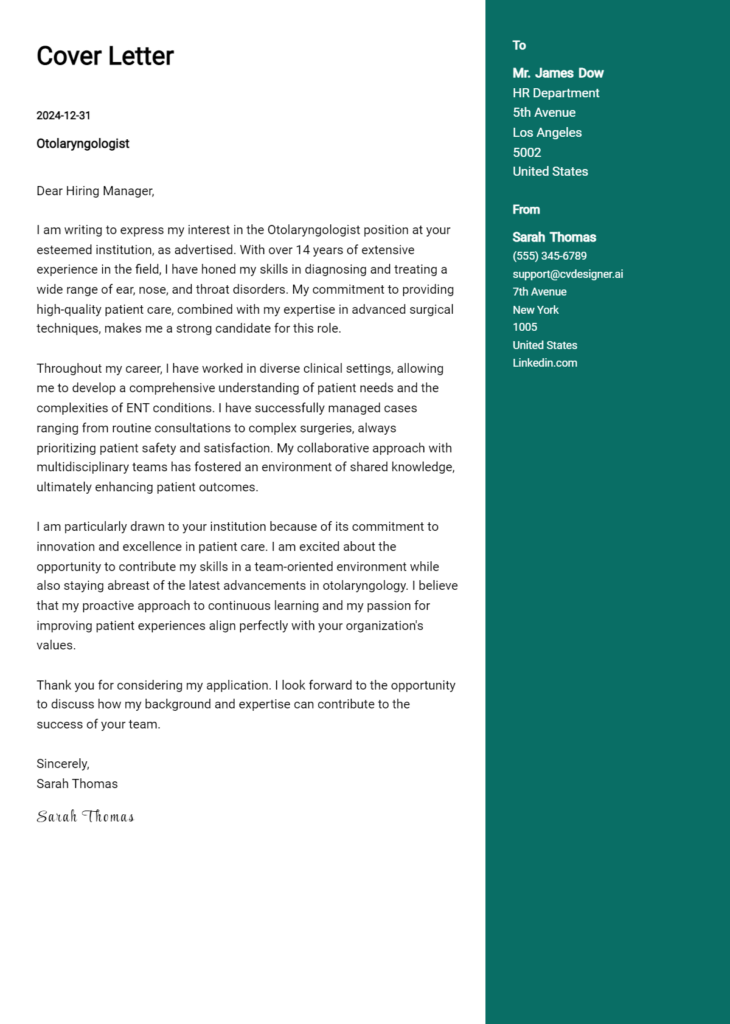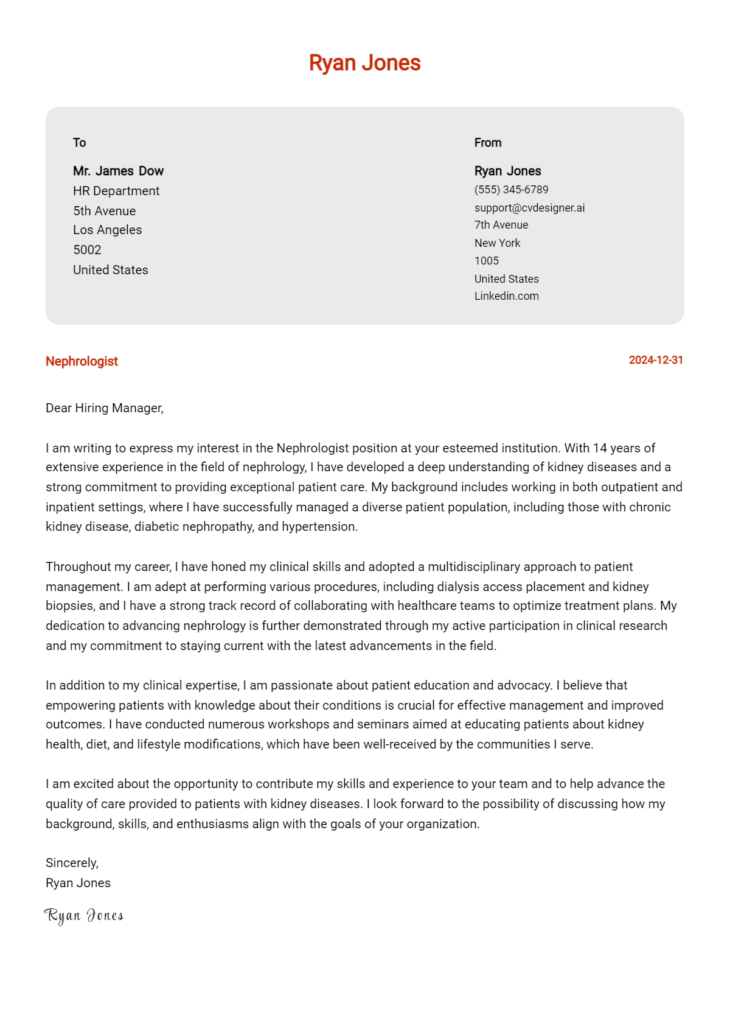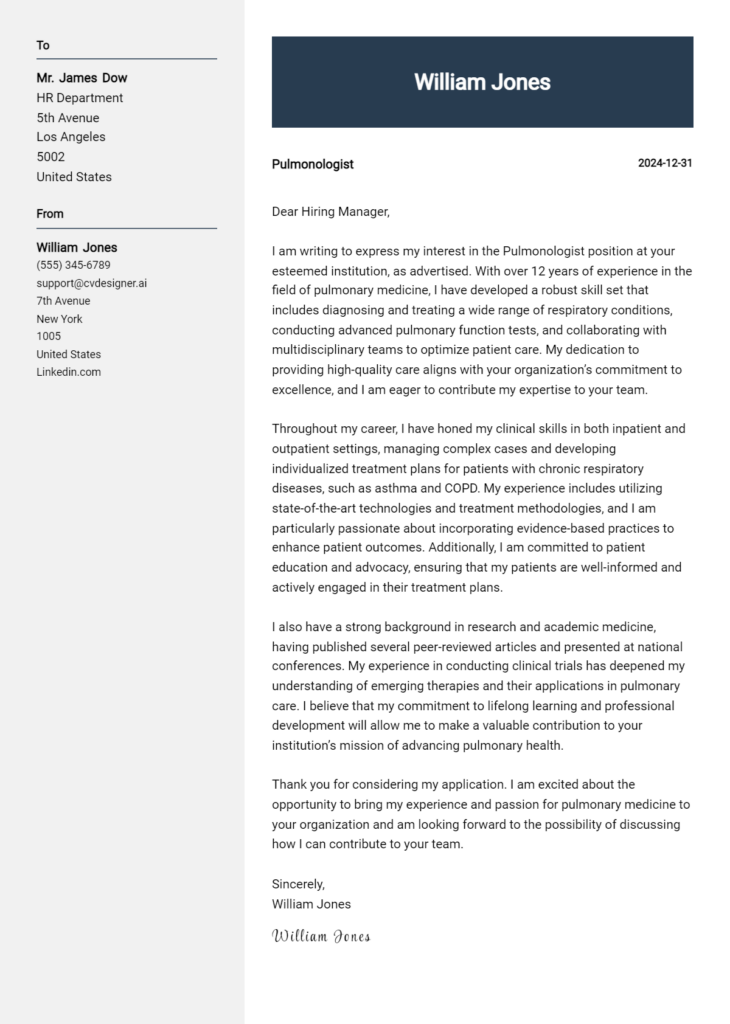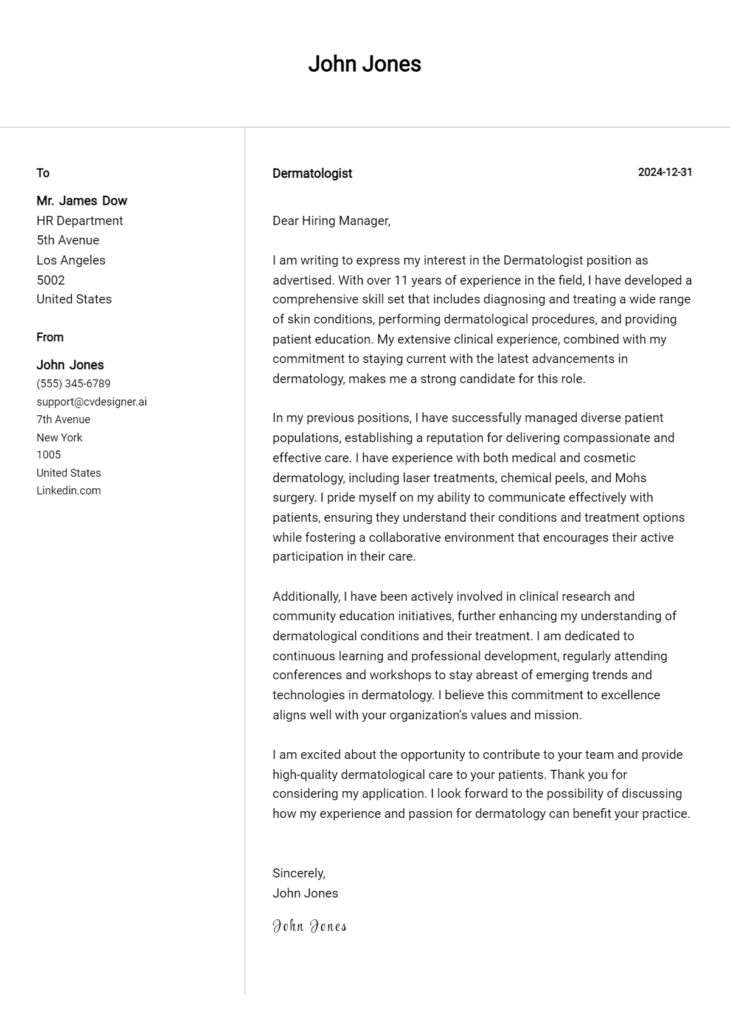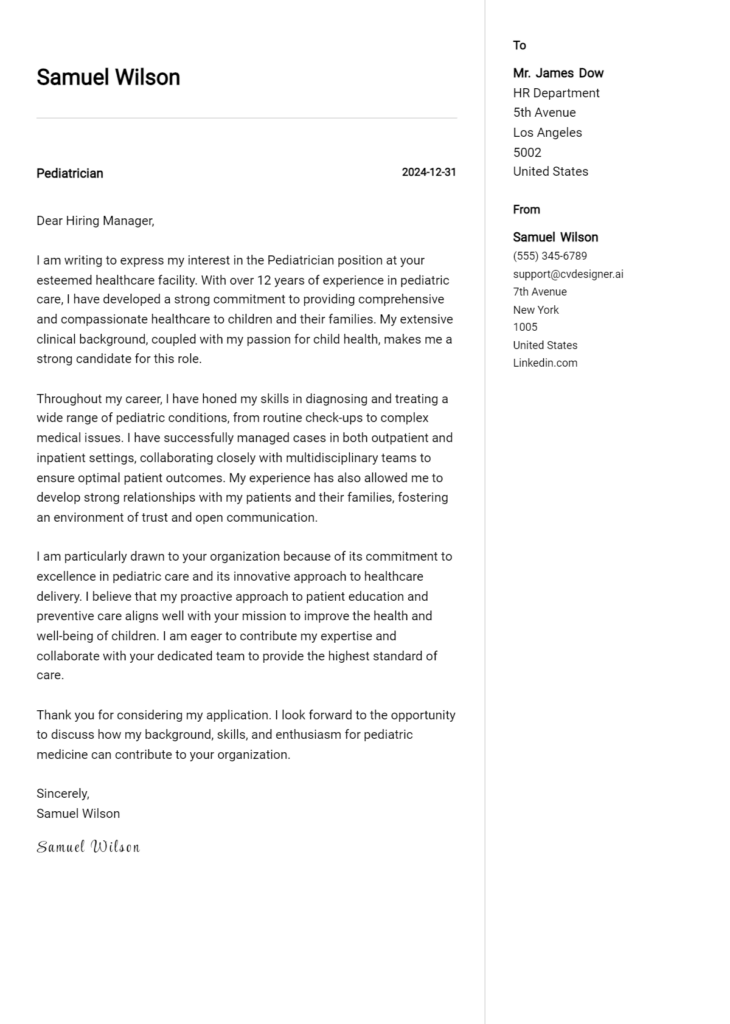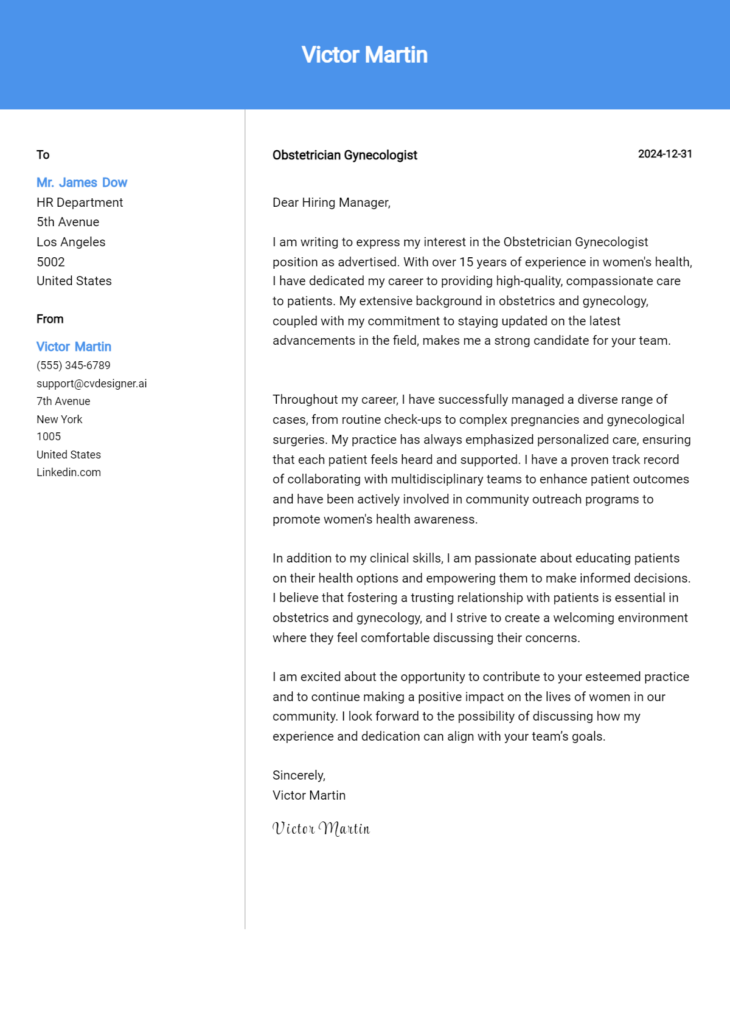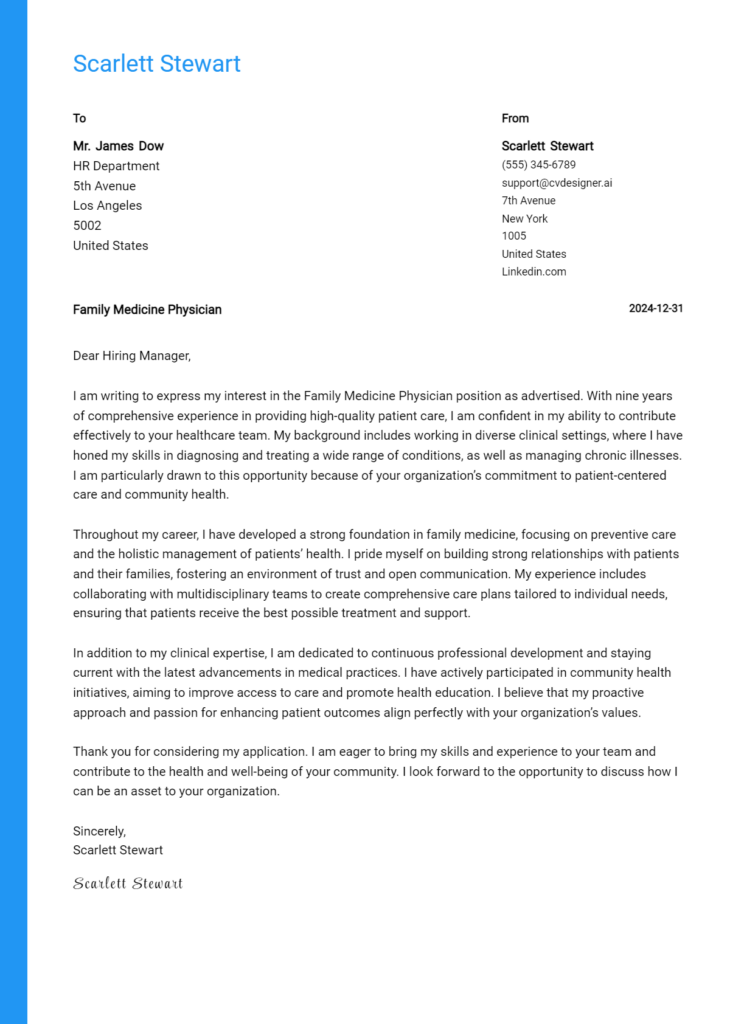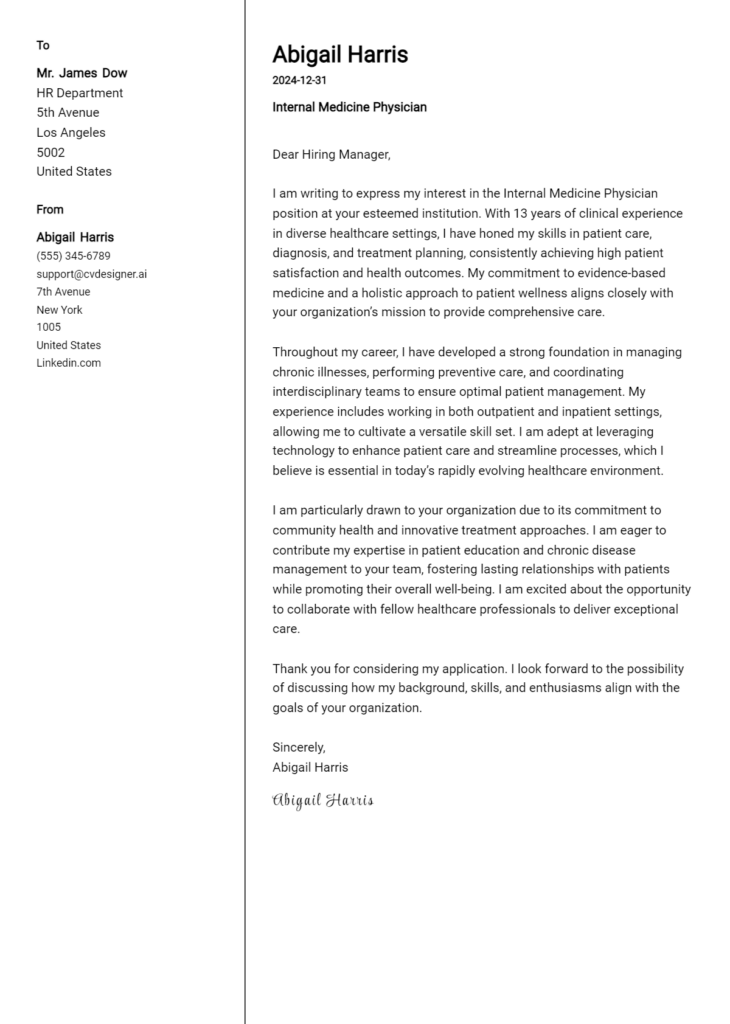Oncologist Cover Letter Examples
Explore additional Oncologist cover letter samples and guides and see what works for your level of experience or role.
How to Format an Oncologist Cover Letter?
Crafting a compelling cover letter is essential for oncologists, as it serves as a critical introduction to your medical expertise and compassionate approach to patient care. The formatting of your cover letter not only showcases your qualifications but also reflects your professionalism and attention to detail—qualities that are vital in the medical field. A well-structured cover letter can capture the hiring manager's attention while highlighting your commitment to advancing cancer treatment and improving patient outcomes.
In this guide, we'll explore how to format your oncologist cover letter effectively, focusing on the essential components, including:
- Cover Letter Header
- Cover Letter Greeting
- Cover Letter Introduction
- Cover Letter Body
- Cover Letter Closing
Each section plays a significant role in presenting your skills and experience. Let’s break down each part to help you create a standout oncologist cover letter.
Importance of the Cover Letter Header for an Oncologist
The cover letter header is a crucial element of any professional correspondence, particularly for an oncologist seeking a position in a competitive field. A well-structured header not only conveys your professionalism but also ensures that the recipient can easily identify your contact information and the context of your application. A clear and concise header should include your name, address, phone number, email address, the date, and the recipient's details, such as their name, title, and organization. This format enhances clarity and sets a serious tone for your application, making it easier for hiring managers to reach out to you.
Strong Example
Dr. Jane Smith, MD 123 Cancer Care Lane Oncology Hospital Cityville, ST 12345 (123) 456-7890 jane.smith@email.com October 1, 2023 Dr. John Doe Chief of Oncology Specialty Hospital 456 Health St. Cityville, ST 12345
Weak Example
Jane S. Somewhere, USA jane@email.com 10/1/23 To Whom It May Concern
The Importance of a Cover Letter Greeting for Oncologists
The greeting of your cover letter is more than just a formality; it sets the tone for the entire document and reflects your professionalism and attention to detail. By addressing the hiring manager directly, you create a sense of personalization that can make your application stand out in a competitive field like oncology. A well-crafted greeting demonstrates your genuine interest in the position and your respect for the recipient's role in the hiring process. To avoid sounding generic, take the time to research the name of the hiring manager or the relevant department head. This small effort can make a significant difference in how your cover letter is received.
When crafting your greeting, aim for one that is both strong and engaging. Here are some examples:
Strong Greeting Example
Dear Dr. Smith,
Weak Greeting Example
To Whom It May Concern,
The Importance of a Strong Cover Letter Introduction for an Oncologist
A well-crafted cover letter introduction is crucial for an oncologist seeking a position in a competitive healthcare environment. This opening paragraph serves as your first impression, capturing the hiring manager's attention while expressing your genuine interest in the role. A strong introduction not only highlights your passion for oncology but also succinctly showcases key skills and notable achievements that make you a valuable candidate. Conversely, a weak introduction can fail to engage the reader, leaving them unimpressed and less inclined to read further. Below are examples of both strong and weak cover letter introductions for an oncologist position.
Strong Example
Dear [Hiring Manager's Name], I am writing to express my enthusiasm for the oncologist position at [Hospital/Clinic Name], as advertised on [Job Board/Website]. With over 10 years of experience in clinical oncology and a proven track record of improving patient outcomes through innovative treatment plans, I am eager to contribute my expertise to your esteemed team. My commitment to advancing cancer care is matched only by my dedication to patient-centered approaches, making me a strong fit for this role.
Weak Example
Hello, I saw the job opening for an oncologist and thought I would apply. I have some experience in the field and am looking for a new job. I hope to bring my skills to your hospital.
Purpose of the Cover Letter Body for an Oncologist
The cover letter body for an oncologist serves as a critical platform for candidates to showcase their unique skills, relevant experiences, and the value they bring to a healthcare organization. It allows oncologists to highlight specific projects or accomplishments that demonstrate their ability to provide high-quality patient care, engage in innovative treatment approaches, and contribute to interdisciplinary teams. By articulating their clinical expertise and passion for oncology, candidates can effectively persuade hiring managers that they are well-suited for the role and can make a meaningful impact on patient outcomes.
Strong Example
Dear [Hiring Manager's Name], I am writing to express my interest in the oncologist position at [Company Name]. With over ten years of experience in clinical oncology, I have successfully managed a diverse patient population, specializing in breast and lung cancers. At my previous position at [Previous Company], I led a multidisciplinary team to develop a new treatment protocol that increased patient survival rates by 20% over three years. Additionally, my involvement in clinical trials has equipped me with a deep understanding of emerging therapies, allowing me to provide cutting-edge care. I am committed to patient-centered care and continuous improvement, and I am excited about the opportunity to contribute to [Company Name]'s mission of advancing cancer treatment. Sincerely, [Your Name]
Weak Example
Dear [Hiring Manager's Name], I would like to apply for the oncologist job at [Company Name]. I have worked in this field for a while and have treated many patients. I am familiar with various treatments and have done some research. I think I would be a good fit for your team because I am hardworking. I hope you consider my application. Best, [Your Name]
Importance of Cover Letter Closing for an Oncologist
The closing paragraph of a cover letter for an oncologist is crucial as it encapsulates the candidate's qualifications, reiterates their enthusiasm for the role, and encourages the hiring manager to take the next steps. A strong closing reinforces the candidate's suitability and leaves a lasting impression, while a weak closing may fail to convey the candidate's eagerness or professionalism.
Strong Example
Thank you for considering my application for the oncologist position at [Hospital/Clinic Name]. With my extensive experience in patient-centered care, innovative treatment plans, and a dedicated approach to oncology, I am eager to contribute to your team. I am excited about the opportunity to discuss how my skills align with the mission of your institution. I look forward to the possibility of an interview to further explore how I can support your patients and their families. Please find my resume attached for your review.
Weak Example
I hope you think about my application. I guess I would be a good fit for the oncologist job. Let me know if you want to talk. My resume is attached.
Common Mistakes to Avoid in a Oncologist Cover Letter
Crafting a compelling cover letter is essential for standing out in the competitive field of oncology. Avoiding common mistakes can significantly enhance your chances of securing an interview. Here are some pitfalls to watch out for:
Generic Content: Using a one-size-fits-all approach can be detrimental. Tailor your letter to the specific position and institution. Mention why you’re interested in that particular role.
Lack of Specificity: Failing to include specific examples of your experience and achievements can weaken your application. Highlight relevant cases or research that demonstrate your expertise.
Ignoring Format: A poorly formatted cover letter can detract from your professionalism. Follow a clear cover letter format to ensure readability and organization.
Typos and Grammatical Errors: Simple mistakes can undermine your credibility. Always proofread your letter or ask a colleague to review it before submission.
Overly Technical Language: While you want to showcase your expertise, using excessive jargon can alienate readers. Aim for a balance that conveys your knowledge while remaining accessible.
Neglecting Personal Touch: A cover letter should reflect your personality and passion for oncology. Share your motivation for entering the field and what drives your commitment to patient care.
Failing to Address the Employer: Not addressing the cover letter to a specific person can seem impersonal. Research the hiring manager's name and personalize your greeting.
By steering clear of these common mistakes and utilizing resources like cover letter examples, you can create a strong, impactful cover letter that sets you apart in your job search.
Cover Letter FAQs for Oncologist
What should I include in my cover letter as an oncologist?
In your cover letter, include your educational background, relevant certifications, and any specialized training in oncology. Highlight your experience in diagnosing and treating cancer, along with any clinical trials or research you’ve participated in. Mention your ability to work in multidisciplinary teams and your commitment to patient-centered care. It’s also beneficial to discuss your communication skills, particularly in explaining complex treatment options to patients and their families. Lastly, personalize your letter by expressing your interest in the specific institution and how your values align with their mission.
How can I demonstrate my passion for oncology in my cover letter?
To convey your passion for oncology, share personal anecdotes or experiences that inspired your career path. Discuss specific moments in your training or practice that solidified your commitment to cancer care. You might mention a particular patient interaction that had a profound impact on you or describe any volunteer work in cancer awareness and research. Additionally, express your eagerness to contribute to advancements in oncology, whether through research, teaching, or community outreach programs. This personal touch can set your cover letter apart and resonate with hiring committees.
How long should my cover letter be?
Your cover letter should ideally be one page long, comprising three to four paragraphs. This length allows you to succinctly convey your qualifications and enthusiasm without overwhelming the reader. Focus on clarity and coherence, ensuring that each paragraph serves a purpose—introducing yourself, detailing your relevant experience, and concluding with a strong call to action. Avoid lengthy descriptions; instead, opt for concise, impactful statements that highlight your strengths. Remember, a well-structured letter that respects the reader's time can leave a positive impression.
Should I tailor my cover letter for each job application?
Absolutely! Tailoring your cover letter for each application is crucial in showcasing your genuine interest in the specific role and institution. Research the organization’s values, recent achievements, and any specific programs that align with your expertise. Customize your letter to reflect how your skills and experiences meet the job requirements and contribute to their mission. By addressing the unique aspects of the job and demonstrating that you understand the organization’s goals, you will stand out as a candidate who is committed and well-prepared for the position.
Build your Cover Letter in minutes
Use an AI-powered cover letter builder and have your letter done in 5 minutes. Just select your template and our software will guide you through the process.

